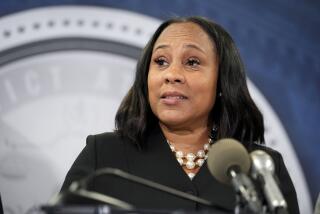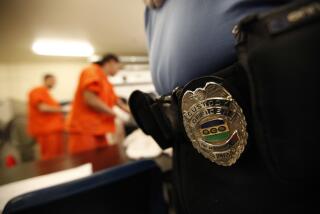Roberts Unlikely to Trigger Break of Filibuster Pact
The group of maverick Democrats and Republicans who reached a truce in partisan warfare over judicial nominations this year decided Thursday that President Bush’s nomination of John G. Roberts Jr. to the Supreme Court was not “extraordinary” enough to break that peace.
At their first meeting since Bush picked the appellate court judge to succeed retiring Supreme Court Justice Sandra Day O’Connor, the so-called Gang of 14 decided that the nomination did not warrant a filibuster -- at least, based on what is known about Roberts so far.
“There’s no indications so far that there will be a filibuster, and I think that was the consensus in the meeting,” Sen. Mike DeWine (R-Ohio) said. “But I think people are reserving the right to see what comes out of the [Judiciary Committee] hearings.”
The seven Democrats and seven Republicans in the group represent enough votes to prevent Democrats from mustering the 41 votes they would need to sustain a filibuster. As a group, they also could thwart Republican efforts to change the rules for filibusters.
At the time of the judicial showdown in May, the 14 decided that their agreement on filibusters could be broken only by “extraordinary circumstances” -- a term they deliberately did not define.
At least at first glance, they said, it did not mean Roberts.
“This is a credible nominee, and not one that, as far as we know now, has a record that in any sense could be described as extremist,” Sen. Joe Lieberman (D-Conn.) said.
For the most part, the group’s Democrats were more circumspect than the Republicans, emphasizing that they could not yet make a final judgment about Roberts.
“I’ll know what extraordinary circumstances are in this case if and when I see them,” Sen. Robert C. Byrd (D-W.Va.) said. “It’s a little early to make any comments beyond that.”
In a speech here, Bush urged both sides to conduct “not only a civil debate, but a timely debate” on Roberts’ nomination.
“I urge the Senate to do its duty to have a fair, timely hearing, and get this good man confirmed in time for the October reconvening of the court,” Bush said.
Roberts continued his efforts to woo the Senate, meeting with two of the most liberal Democrats on the Judiciary Committee: Sen. Edward M. Kennedy (D-Mass.) and Sen. Charles E. Schumer (D-N.Y.).
Schumer presented Roberts with a list of questions he planned to ask during the committee’s hearings, including whether the Constitution implied a right to privacy and whether the Supreme Court’s landmark abortion ruling in Roe vs. Wade was correct.
“I have long believed that federal court candidates -- who serve for life -- should explain their judicial philosophy and their method of legal reasoning,” Schumer told reporters. “They should be prepared to explain their views of the Constitution, of decided cases, of federalism, and a host of other issues relevant to that lifetime post.”
Kennedy asked Roberts what he considered his role would be on the court, a Kennedy aide said.
“I think of my role as modest,” the aide quoted Roberts as replying.
Times staff writers Janet Hook and Edwin Chen contributed to this report.
More to Read
Get the L.A. Times Politics newsletter
Deeply reported insights into legislation, politics and policy from Sacramento, Washington and beyond. In your inbox three times per week.
You may occasionally receive promotional content from the Los Angeles Times.






